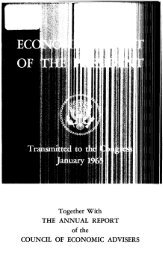Economic Report of the President
Report - The American Presidency Project
Report - The American Presidency Project
- No tags were found...
You also want an ePaper? Increase the reach of your titles
YUMPU automatically turns print PDFs into web optimized ePapers that Google loves.
this problem by authorizing, effective May 1, 1982, a 91-day time depositwith a $7,500 minimum denomination indexed to <strong>the</strong> 91-dayTreasury bill rate, and establishing, effective September 1, 1982, a 7-to 31-day deposit account with a $20,000 minimum denomination,also indexed to <strong>the</strong> 91-day Treasury bill rate.Following <strong>the</strong> directions given by <strong>the</strong> Garn-St Germain Act, <strong>the</strong>DIDC authorized, effective December 14, 1982, a new money marketdeposit account that can be <strong>of</strong>fered by commercial banks, savings andloan associations, and mutual savings banks. In addition, <strong>the</strong> DIDGauthorized a new super NOW account, effective January 5, 1983. Nei<strong>the</strong>raccount is subject to interest rate ceilings when account balancesexceed $2,500. The DIDC also reduced to $2,500 <strong>the</strong> minimum denominationrequired on <strong>the</strong> 6-montfi money market deposits, <strong>the</strong> 91-day time deposits, and <strong>the</strong> 7- to 31-day time deposits.The introduction <strong>of</strong> NOW accounts nationwide in 1981, <strong>the</strong> authorization<strong>of</strong> <strong>the</strong> new money market accounts at banks and thrifts,and <strong>the</strong> general phasing out <strong>of</strong> interest rate restrictions substantiallyincrease <strong>the</strong> ability <strong>of</strong> depository institutions to compete for funds.Simultaneously, various actions have been taken to allow thrift institutionsgreater flexibility in <strong>the</strong> investment <strong>of</strong> funds. The Deregulationand Monetary Control Act expands <strong>the</strong> asset powers <strong>of</strong> savingand loan associations and mutual savings banks to include consumer,corporate, and business loans. This will lead to more diversified portfoliosfor <strong>the</strong>se institutions. In addition, new regulations issued by<strong>the</strong> Comptroller <strong>of</strong> <strong>the</strong> Currency in 1981 and <strong>the</strong> Federal HomeLoan Bank Board in 1982 permit depository institutions to <strong>of</strong>fer variablerate mortgages. Finally, <strong>the</strong> Garn-St Germain Act provides forFederal preemption <strong>of</strong> State laws and judicial decisions that restrict<strong>the</strong> enforcement <strong>of</strong> due-on-sale clauses in real property loans.The Garn-St Germain Act also deals with <strong>the</strong> problems <strong>of</strong> <strong>the</strong> savingsand loan institutions discussed above. It provides capital assistanceto depository institutions that have suffered earnings and capitallosses resulting from regulatory restraints on <strong>the</strong>ir assets and liabilities.The assisted institutions issue capital investments, called "networth certificates," which <strong>the</strong> insuring agencies purchase with promissorynotes. This increase in net worth reduces <strong>the</strong> likelihood <strong>of</strong> insolvenciesarising from losses created by holdings <strong>of</strong> old, fixed-ratemortgages. As market rates <strong>of</strong> interest fall, and <strong>the</strong> earnings <strong>of</strong> <strong>the</strong>sedepository institutions improve, <strong>the</strong> net worth certificates will be retired.Legislation following <strong>the</strong> banking collapse <strong>of</strong> <strong>the</strong> 1930s tended toprevent competition among financial institutions and created a complexand <strong>of</strong>ten counterproductive labyrinth <strong>of</strong> financial regulations.Recent legislation and regulatory changes have begun to reverse this118
















